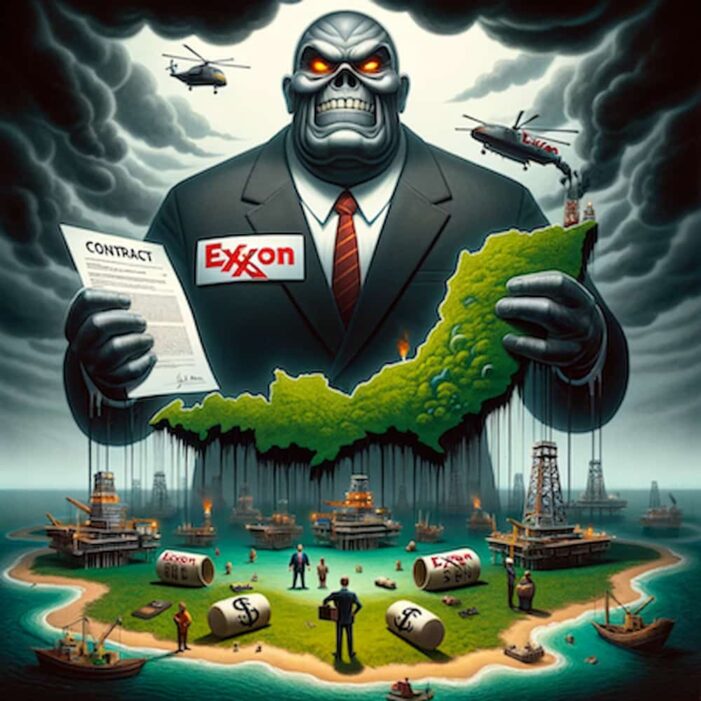Photo source: This image was created with the assistance of DALL·E 2.
By Arthur Piccolo
On the eastern coast of South America, there is a small nation called Guyana. Known for its lush rainforests, vibrant culture, and promising potential, Guyana caught the eye of a mighty corporate behemoth. No, it wasn’t a fairy tale villain—it was ExxonMobil, the modern-day colonial master.
Welcome to “Exxon Owns Guyana,” where the plot twists are predictable, and the villains wear suits and ties, wielding balance sheets instead of swords. If you’ve ever wondered what neo-colonialism looks like in the 21st century, look no further than the picturesque shores of Guyana, now a glittering jewel in ExxonMobil’s crown.
It all began with a stroke of luck—or perhaps a stroke of a drilling rig. In 2015, ExxonMobil hit the jackpot with the Liza-1 well, a discovery that promised untold riches beneath the ocean floor. And like moths to a flame, the corporate titans swooped in, penning a contract that would make the East India Company blush with envy.
Guyana, eager for development and prosperity, signed on the dotted line. Little did they know, or did they ??? know they had just inked a deal with the devil, where “sanctity of contracts” became the new mantra for “we got you.”
ExxonMobil’s contract with Guyana is a masterpiece of corporate cunning. With a mere 2% royalty and a profit-sharing scheme that would make Robin Hood weep, ExxonMobil ensured that it would walk away with the lion’s share of the profits 85% for Exxon, 15% for Guyana. After all, why settle for a piece of the pie when you can have all you can steal?
But wait, there’s more! ExxonMobil, in its infinite wisdom, included clauses that allow it to recover 75% of its operational costs before sharing profits. And as a cherry on top, Guyana graciously agreed to pay ExxonMobil’s taxes. It’s almost as if the contract was written by ExxonMobil’s board of directors during a particularly lucrative lunch break.
Gone are the days of colonial governors and imperial armies. Today, corporate boardrooms and PR campaigns rule the land. ExxonMobil, with its deep pockets and deeper influence, has managed to do what colonial powers of old could only dream of—owning a country without firing a single shot.
Guyana’s politicians, swayed by the promise of immediate economic gains and the specter of “investor confidence,” have become ExxonMobil’s willing accomplices. President Ali and his administration chant the sacred hymn of “sanctity of contracts,” while Vice President Jagdeo praises the economic benefits that trickle down like crumbs from a billionaire’s table.
Of course, not everyone is enamored with this corporate conquest. Brave souls like former President David Granger, lawyer Christopher Ram, and the outspoken Glenn Lall have raised their voices, calling for justice and renegotiation. They argue for a fair share of the oil wealth, stronger environmental protections, and transparency.
But in a land where ExxonMobil’s shadow looms large, these voices are often drowned out by the clinking of champagne glasses in corporate boardrooms and the rustling of dollar bills and hidden payments to Guyanese politicians.
As ExxonMobil drills deeper and pockets grow fatter, the people of Guyana are left to wonder: what happened to the promise of prosperity? Where are the schools, hospitals, and infrastructure projects that were supposed to transform their lives ? Where is over $100 Billion Exxon will grab.
“Exxon Owns Guyana” is not just a commentary—it’s a call to action. It’s a reminder that the fight for fairness, equity, and justice is far from over. The people of Guyana deserve better than crumbs from the corporate table. They deserve a fair share of their nation’s wealth and a government that puts their interests first. At the very least 50% for Guyana and 50% for Exxon and none of the BS clauses that have Guyana paying Exxon’s expenses.
In the end, the story of Exxon and Guyana is still being written. And with enough courage, resilience, and unity, perhaps the people of Guyana can reclaim their narrative and write a new chapter—one where they truly own their future. Right now all Guyana has is an historic conspiracy to defraud the people of Guyana that involves Exxon and host of Guyana’s “leaders” that appears to include President Ali and Vice President Jagdeo.
The Guyanese people can either roll over and play dead or they can become heroes not only for Guyana but the entire global community by proving greedy corrupt behemoths like ExxonMobil do not rule the world.
Arthur Piccolo, Chairman of Bowling Green Association in Lower Manhattan, New York City, has long been interested in America’s greatest immigrant, Alexander Hamilton, who lived and is buried in Lower Manhattan. This interest led to his wider interest in the Caribbean generally, its past, present, and future.





